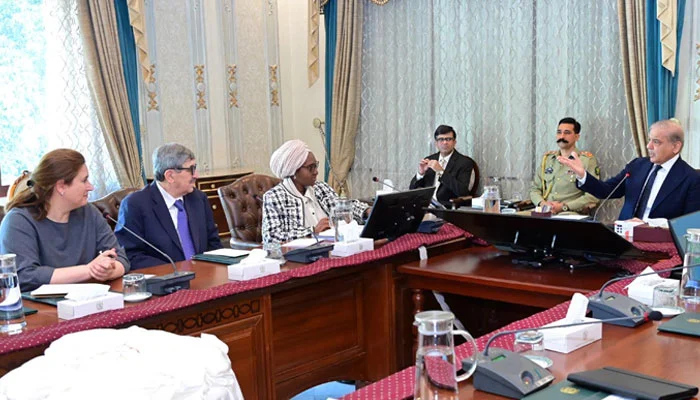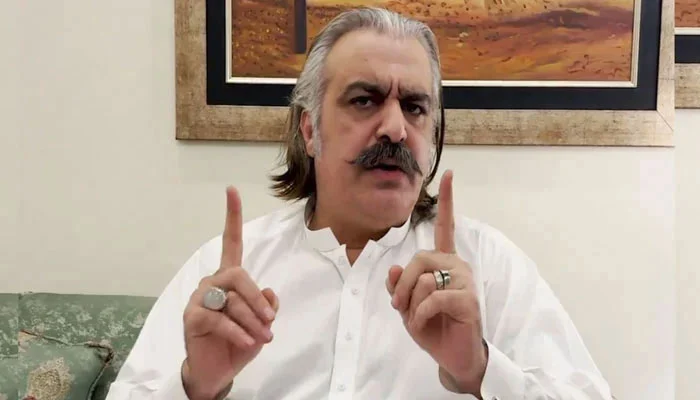ISLAMABAD: Prime Minister Muhammad Shehbaz Sharif on Monday reaffirmed that the government is focused on fostering investment and partnerships rather than relying on loans.
He made these remarks during a meeting with a delegation of World Bank (WB) executive directors, according to a press release issued by the PM Office Media Wing.
Ministers Ahsan Iqbal, Ahad Khan Cheema, Sardar Owais Khan Leghari, Dr. Musadik Malik, Ministers of State Ali Pervaiz Malik and Shaza Fatima Khawaja, PM’s Coordinator Romina Khurshid Alam, Senator Sherry Rehman, Nafisa Shah MNA, PM’s Representative for Polio Program Ayesha Raza Farooq, and senior officials attended the meeting.
“The country’s economy is on the right path and moving toward growth,” the prime minister stated, crediting the turnaround to the dedicated efforts of his economic team.
Economic Growth and Transparency
The prime minister noted that Pakistan’s exports and remittances are on the rise, while falling interest rates are encouraging investment in the production sector. He also highlighted that the government is implementing transparency measures to curb corruption, with digitization playing a central role in the Federal Board of Revenue (FBR) reforms.
Discussing the power sector, Shehbaz Sharif emphasized that reforms aim to ensure uninterrupted electricity supply and minimize losses. He praised the Special Investment Facilitation Council (SIFC) for creating an attractive investment climate in Pakistan, operating through a unique system that includes all key stakeholders.
World Bank Partnership
Shehbaz Sharif acknowledged Pakistan’s long-standing partnership with the World Bank, spanning over seven decades, and credited the institution for its role in completing key development projects. He also expressed gratitude for the World Bank’s support during the 2022 floods, which significantly aided rehabilitation efforts.
He welcomed the World Bank’s recent Country Partnership Framework (CPF), which includes a $40 billion investment in Pakistan. Of this, $20 billion is allocated for projects in health, education, youth development, and other social sectors, while an additional $20 billion investment through the International Finance Corporation (IFC) is set to boost private sector growth.
Delegation’s Response
The World Bank delegation expressed confidence in Pakistan’s ongoing reform program, acknowledging its positive outcomes. They also appreciated the government’s efforts in maintaining economic stability and implementing institutional reforms.
The delegation later met with Sindh Chief Minister Syed Murad Ali Shah and provincial cabinet members at Sindh House, Islamabad. They expressed satisfaction over the transparent and efficient use of funds allocated for Sindh’s development projects.
Murad Ali Shah briefed the delegation on ongoing World Bank-supported projects in Sindh, highlighting the province’s collaboration with the bank in rehabilitating flood victims. He noted that $1.6 billion was promptly approved by the World Bank for post-flood recovery efforts, and the Sindh government is rapidly constructing houses for displaced families under PPP Chairman Bilawal Bhutto Zardari’s directives.
IMF and Economic Reforms
In a related development, IMF Managing Director Kristalina Georgieva praised Finance Minister Mohammad Aurangzeb for staying committed to economic reforms despite challenges. Speaking at a debate in Saudi Arabia on challenges facing emerging markets, she commended Pakistan’s fiscal discipline, noting that the debt-to-GDP ratio had been reduced from over 73% to mid-60s.
Aurangzeb emphasized that Pakistan is shifting towards an export-led growth model and aims to fundamentally transform its economic structure.
Government’s Privatization and Digitalization Drive
Meanwhile, Minister for Economic Affairs Ahad Cheema welcomed a delegation of World Bank executive directors, highlighting the government’s privatization plan for state-owned enterprises (SOEs). He stated that:
- The government aims to privatize up to 50 SOEs over the next 3–4 years.
- The first phase will focus on power distribution companies (DISCOs) and Pakistan International Airlines (PIA).
- Addressing high electricity tariffs and line losses remains a priority in the energy sector.
Cheema also underlined Pakistan’s progress in digital transformation, noting that end-to-end digitalization of institutions is underway. He highlighted technical training programs for youth and women’s empowerment, emphasizing that Pakistan is among the world’s largest sources of trained freelancers.
World Bank’s Continued Support
The World Bank delegation commended Pakistan’s commitment to reforms and expressed strong support for the government’s CPF initiatives. They emphasized aligning efforts to tackle pressing challenges, including climate change, governance, and gender equality.
Cheema stressed the need for a comprehensive strategy to address key implementation challenges such as project preparation, procurement, and land acquisition. He also expressed gratitude for the World Bank’s unwavering support in Pakistan’s development journey.




